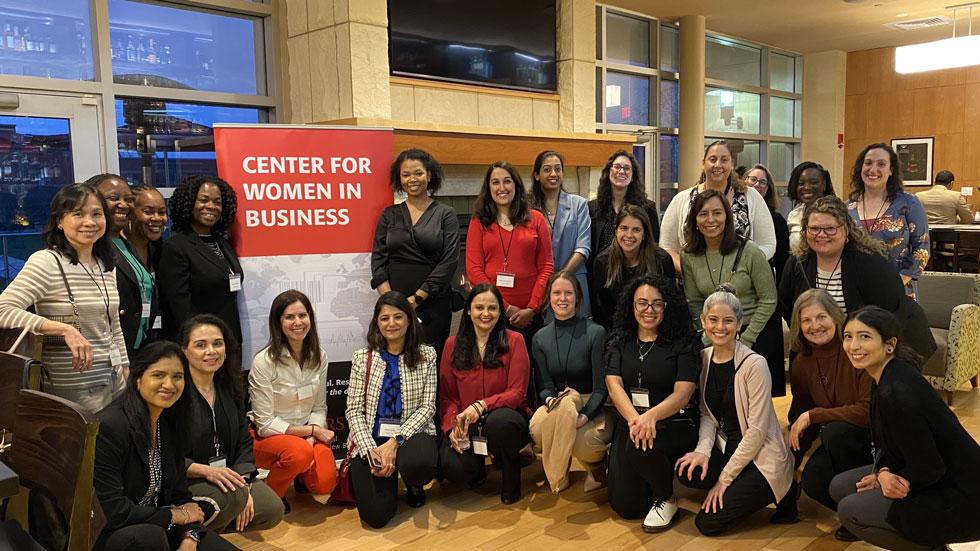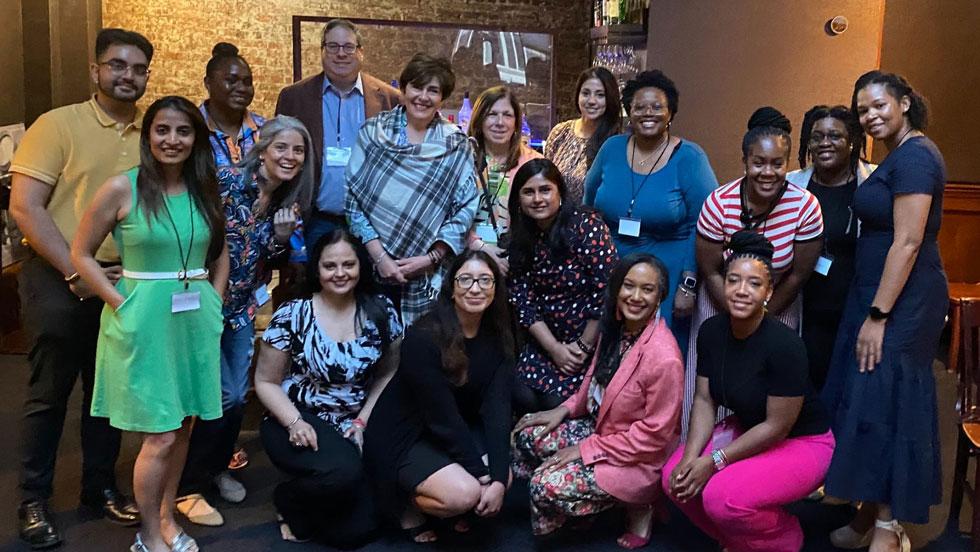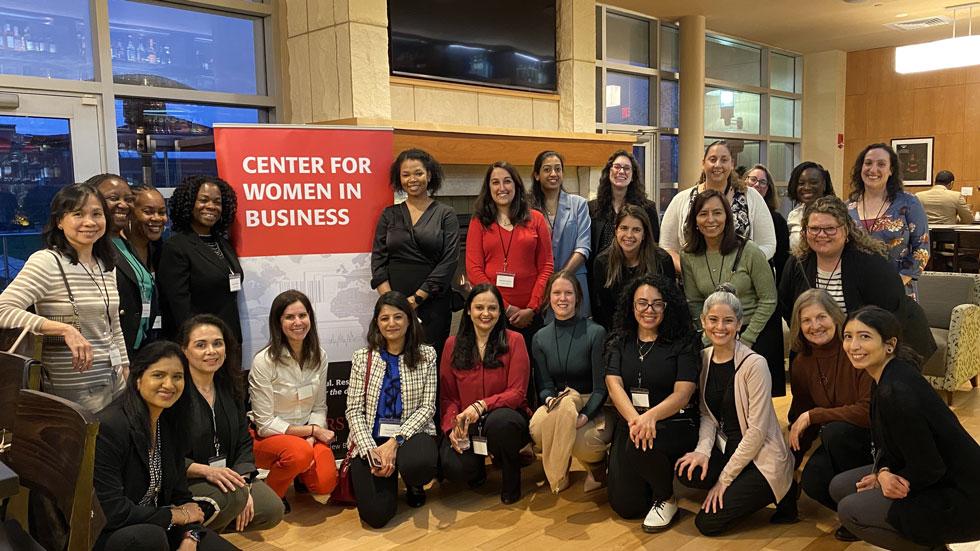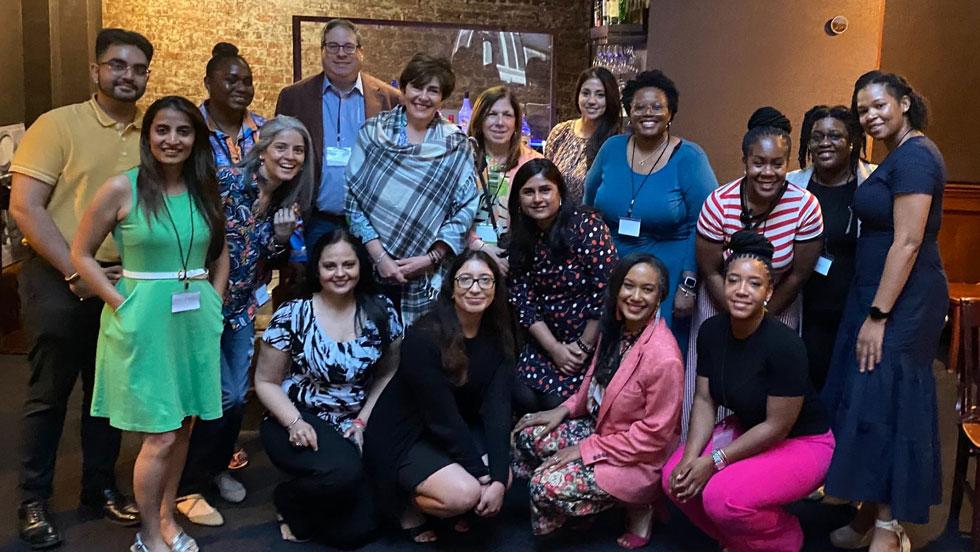
This is the second in a series of profiles about the Nareit Foundation’s DTD 2025 grantees and grant program. The grant program falls under the Foundation’s DTD initiative, which focuses on increasing the visibility, awareness, and appeal of the REIT industry to more businesses, workforce talent, and communities. There are three priority areas: supporting pipeline/talent development, expanding procurement and business development, and helping everyday investors understand REITs and how to invest in them.
In 2025, The Nareit Foundation awarded grants to nine nonprofit organizations. This article profiles Rutgers Business School Center for Women in Business (CWIB), and how its work addresses the DTD initiative’s priority of supporting pipeline/talent development.
In today’s competitive talent landscape, retaining experienced women in the workforce isn’t just the right thing to do—it’s a smart business strategy. Companies that focus on retaining and promoting mid-career women to leadership roles benefit from stronger succession pipelines, better financial performance, improved business decisions, and lower turnover costs, according to numerous studies.
Yet it’s clear that corporate America still has a long way to go in taking these findings to heart. A McKinsey & Company report shows that although women comprise nearly half of the workforce in the United States only 29% hold senior leadership roles. In addition, women represent just 11% of CEOs on the 2025 Fortune 500 list. Furthermore, women are less likely than their male counterparts to receive the mentorship and sponsorship needed to propel them to these executive positions.

Lisa Kaplowitz, co-founder and executive director of the Rutgers Business School Center for Women in Business (CWIB)—a Nareit Foundation 2025 grantee—has built her career around addressing this dichotomy.
After more than two decades in finance as an investment banker and CFO, she understands the challenges women face not just in entering the industry, but in staying and advancing.
“I was the only woman at the table throughout my career,” Kaplowitz notes. “I was told that I don’t look like a CFO and my career aspirations and timelines would change after having a baby.”
Now, Kaplowitz is leading efforts to “keep talented and qualified women, especially mid-career women, in the workplace longer, more competitively, and on track for senior leadership,” she says. “We're building communities to help level the playing field and create a workplace that works for everyone.”
CWIB’s latest initiative, G.R.O.W. (Gaining and Retaining Outstanding Women), focuses on helping companies, including REITs, keep high-potential women engaged, supported, and prepared to lead.
Time to Take Action
When Kaplowitz left the corporate world and entered academia as a finance professor at Rutgers Business School, she recognized a gap in programming.
“I looked around and noticed that there were pockets of programming for women at the business school, but there wasn't anything comprehensive and cohesive, so I said, “Let's create it.’”
In 2019, the CWIB was launched. The initiative helps women overcome barriers to achieve success by navigating the challenges women face through trailblazing research, programming, and mentoring.
“Our mission is threefold: remove barriers, build community, and empower women because we know from the research, from our lived experiences, that it doesn't matter how qualified and skilled she is, there are structural and institutional barriers that hold her back,” Kaplowitz explains.
CWIB Delivers Actionable Data and Strategies
The CWIB, located in the heart of Rutgers Business School (RBS), is a powerful community of academic leaders, industry experts, and accomplished alumni uniquely positioned to advance women in the workplace.
CWIB distinguishes itself by actively integrating academic research with industry best practices to address the underrepresentation of women in business leadership roles. It leverages its unique position within the RBS to offer research-backed insights and practical solutions to individuals, corporations, and organizations.
“We’re a research center,” Kaplowitz says, “so everything we do is grounded in research-backed insights.” For example, we know from prior research that having gender-diverse executive teams can increase company profits by as much as 39%.
With such compelling statistical evidence, Kaplowitz says organizations can see the direct business value of investing in women's professional development and creating more inclusive workplace environments.
The CWIB’s research aims to deliver real-world, actionable strategies that business leaders can use to create more inclusive and effective workplaces. In addition to being a research center, the CWIB is “run by seasoned business executives, so we're in a unique position to turn cutting-edge research into real organizational impact,” Kaplowitz says.
Nareit Foundation Grant Fosters Career G.R.O.W.TH
The grant will help the CWIB accelerate its G.R.O.W. virtual group mentoring program to provide tailored mentoring and expand opportunities specifically for real estate and REIT professionals.
In turn, the G.R.O.W. program will help REITs develop leadership pipelines and improve talent retention. The CWIB will do this by creating REIT-specific mentoring cohorts to target mid-career women and help keep them in the workplace and on track for senior leadership. The program pairs seasoned professionals with aspiring women leaders. Opportunities exist for both mentees and mentors in the REIT sector.

Each group, led by a duo of senior executives/coaches, uses peer mentoring to foster leadership and accountability. Cohorts are prudently structured to include mentees from diverse backgrounds, roles, and industries for targeted support to help women advance in leadership roles.
If you can’t measure it though, you can’t manage it, which is why the grant will also help fund a database to track participant impact and measure long-term outcomes of the REIT-specific mentoring program.
In other industries, G.R.O.W. has proven successful with more than 90% of program participants reporting increases in confidence, executive presence, and self-advocacy, Kaplowitz says.
Importance of Mentoring
“We know that there's something called the role model effect,” Kaplowitz notes. “When we can see it, we can be it, and when we see others in those roles through these executive mentors, it gives us more confidence.”
She says research also demonstrates the importance of the peer effect. The CWIB conducted studies with undergraduate women and discovered that those who have friends in an industry or major are much more likely to stay in that industry or major.
“That’s powerful, and that's what these cohorts can help facilitate,” Kaplowitz points out.
Kaplowitz says the beauty of G.R.O.W. and the Nareit grant is the program is open to everyone, not just Rutgers alumni.
“We know that this program makes a big difference for mid-career women, and we’re so thankful to Nareit for helping fund our ability to really drive this forward,” Kaplowitz says.
Strategic Partnership Offers Direct Value to REITs
The Nareit Foundation views the CWIB partnership as a strategic investment to develop and retain a broader and deeper talent pool and create more inclusive professional environments in the REIT and real estate industries, explains Ayris T. Scales, Nareit's senior vice president of social responsibility & global initiatives.
“G.R.O.W. creates the structure and psychological safety mid-career professionals need to stay connected, feel valued, and see a clear path to leadership. By pairing experienced professionals with aspiring leaders, this program helps REITs strengthen their internal talent pipelines, improve morale, and foster a workplace where people are equipped and motivated to lead.”
Scales also highlights the partnership’s potential to strengthen professional development for women in the REIT industry—particularly in the areas of confidence, self-advocacy, influence, time management, and leadership presence—essential qualities for effective executives.
Future of the CWIB’s Mission
Kaplowitz says the U.S. is at a pivotal point where the external environment is more polarized than ever, which makes CWIB’s work that much more critical.
“What gets us excited is to continue to partner with companies and organizations to remove barriers that are holding women back, look at organizations holistically, expand areas where we can improve hiring of women, and expand the net of talent that we cast,” Kaplowitz says.
What’s most rewarding, Kaplowitz adds, is knowing the value that the CWIB brings, the feedback they receive from corporate partners, the thank-yous from mentees and mentors, and the impact the initiative makes -- and can quantify.
“Personally, it all comes down to purpose,” Kaplowitz says. “It’s knowing that this next generation maybe won't have to experience what we did in the workplace, knowing that she won’t get told that she doesn't look like a CFO, and she won’t have assumptions made about her.”
Applications Open for G.R.O.W. Program
Apply by August 4 to be part of CWIB’s G.R.O.W. mentorship and leadership development program, which will have two cohorts tailored to mid-level REIT industry leaders and managers. Mentoring groups will meet for five virtual sessions from September through December.
REITs that want to know about how they can partner with CWIB and/or other pipeline/talent development initiatives should contact Ayris T. Scales at ascales@nareit.com.
Other DTD Grantee Profiles

